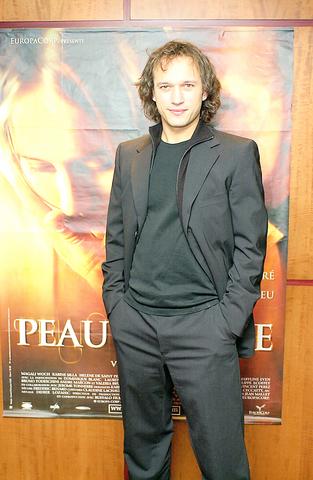Eight years ago when Vincent Perez made his first visit to Taiwan, he was the handsome leading man in the film Queen Margot. Now he has put on more weight, gotten married, and become the father of two daughters. He's also become a director, and it is in this capacity that he makes his second visit to Taipei to promote his debut feature film Once Upon an Angel.
"Being a director is a new chapter in my life," the French filmmaker said at a press conference on Wednesday.
Accompanying Perez is his wife and scriptwriter, actress Karine Sylla, and the 19-year-old actress Morgaine More, who plays the Angel in the film.

PHOTO: TAI LI-AN, TAIPEI TIMES
After a stint as a photographer, Perez made a name for himself by starring in such films as Indochine (1994), Queen Margot (1994) and Beyond the Clouds (1996). He had always dreamed of making movies, and now that his dream has come true, Perez said, "It's like a huge world opened for me."
Once Upon an Angel is about a naive young girl from humble surroundings named Angel who goes to work as a maid in the house of a bourgeois family. There she meets Gregoire, who has returned to the region to attend to the death of his mother. Gregoire is trying to forget his past, and Angel falls in love with him.
Once Upon an Angel has a subtle sensibility, especially in describing a young woman's mind and emotions, which it captures perfectly. Perez's camera casts an affectionate gaze on Angel and her quest for true love, giving the film a feeling of purity and sincerity.
Perez attributes his success in depicting female emotions to More's superb acting and his wife's scriptwriting. "Also, maybe I have a feminine sensibility. I'm always surrounded by women (meaning his wife and two daughters). Women have a vision about the circle of life and death, and I wanted to touch on this subject for my first feature film," he said.
His wife, Karine, agrees: "In reality he is not a very macho man."
Once Upon an Angel will be released in Taiwan on Nov. 23.

That US assistance was a model for Taiwan’s spectacular development success was early recognized by policymakers and analysts. In a report to the US Congress for the fiscal year 1962, former President John F. Kennedy noted Taiwan’s “rapid economic growth,” was “producing a substantial net gain in living.” Kennedy had a stake in Taiwan’s achievements and the US’ official development assistance (ODA) in general: In September 1961, his entreaty to make the 1960s a “decade of development,” and an accompanying proposal for dedicated legislation to this end, had been formalized by congressional passage of the Foreign Assistance Act. Two

Despite the intense sunshine, we were hardly breaking a sweat as we cruised along the flat, dedicated bike lane, well protected from the heat by a canopy of trees. The electric assist on the bikes likely made a difference, too. Far removed from the bustle and noise of the Taichung traffic, we admired the serene rural scenery, making our way over rivers, alongside rice paddies and through pear orchards. Our route for the day covered two bike paths that connect in Fengyuan District (豐原) and are best done together. The Hou-Feng Bike Path (后豐鐵馬道) runs southward from Houli District (后里) while the

March 31 to April 6 On May 13, 1950, National Taiwan University Hospital otolaryngologist Su You-peng (蘇友鵬) was summoned to the director’s office. He thought someone had complained about him practicing the violin at night, but when he entered the room, he knew something was terribly wrong. He saw several burly men who appeared to be government secret agents, and three other resident doctors: internist Hsu Chiang (許強), dermatologist Hu Pao-chen (胡寶珍) and ophthalmologist Hu Hsin-lin (胡鑫麟). They were handcuffed, herded onto two jeeps and taken to the Secrecy Bureau (保密局) for questioning. Su was still in his doctor’s robes at

Mirror mirror on the wall, what’s the fairest Disney live-action remake of them all? Wait, mirror. Hold on a second. Maybe choosing from the likes of Alice in Wonderland (2010), Mulan (2020) and The Lion King (2019) isn’t such a good idea. Mirror, on second thought, what’s on Netflix? Even the most devoted fans would have to acknowledge that these have not been the most illustrious illustrations of Disney magic. At their best (Pete’s Dragon? Cinderella?) they breathe life into old classics that could use a little updating. At their worst, well, blue Will Smith. Given the rapacious rate of remakes in modern